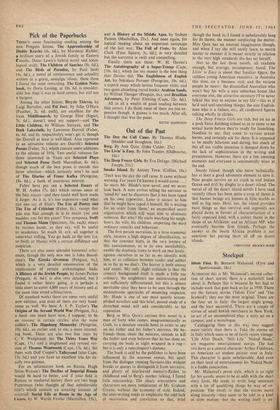Out of the Past
The Day the Call Came. By Thomas Hinde. (Hodder and Stoughton, 16s.) Smoke Island. By Antony Trew. (Collins, 18s.) 'THAT was the day the call came. It came without warning. For years I'd known it would come....' So starts Mr. Hinde's new novel, and we never look back. A note arrives telling the narrator to 'stand by' and he discovers that it has been typed on his own typewriter. Later it occurs to him that he might have typed it himself. He is waiting for an order from 'them,' an unspecified secret organisation which will want him to eliminate someone. But who? He starts watching his neigh- bours, his wife, his children, suspecting the most ordinary remarks and behaviour.
The first person narration, in a terse economic style, ensures a high degree of identification, so that the constant hints, in the very texture of this consciousness, as to its own unreliability, enable the dramatic irony to work on two levels: against ourselves in so far as we identify with him, or as collusion between reader and author in so far as we don't. The horror is both uneasy and comic. My only slight criticism is that the country background itself is made a little too ordinary, the neighbours too uninteresting and not sufficiently differentiated, but this is almost inevitable since they have to be seen through the monochrome spectacles of mounting suspicion. Mr. Hinde is one of our most quietly accom- plished novelists and this brief, poised study of a disturbed mind will add considerably to his reputation.
Berg in Miss Quin's curious first novel is a man of forty who comes, anagrammatically as Greb, to a desolate seaside hotel in order to spy on his father and his father's mistress. He be- friends them, steals the mistress, intends to kill the father and even believes that he has dune so, carrying the body at night wrapped in a rug- but it is only a ventriloquist's dummy.
The book is said by the publisher to have been influenced by the nouveau roman, but apart from the dialogue running Sarraute-like without breaks or quotes to distinguish it from narrative, and plenty of interleaved memory-flashes to childhood and to Berg's mother talking, I found little relationship. The sleazy atmosphere and characters are more reminiscent of Mr. Graham Greene, without the economy of style. Indeed, the over-writing tends to emphasise the odd lack of motivation and conviction so that, brief
though the book is, I found it unbelievably long for its theme, the manner outplaying the matter. Miss Quin has an unusual imagination though, and when I say she will surely learn to match matter to manner it is meant strictly in relation to the very high standards she has set herself.
Not 'so the last three novels, all readable enough, but average, incompetent, banal. The Livin' is Easy is about that familiar figure, the ruthless young American executive, in Australia this time, on a business visit, and the various people he meets: the dissatisfied Australian who won't buy his wife a nice suburban house like everyone else, the attractive secretary (Tye never talked this way to anyone in my life'-this as if he'd said soul-searching things), the nice English- man who is a failure, etc., all cardboard figures talking wholly in cliches.
The Deep Freeze Girls are rich, but on ice in a posh Swiss finishing school so as to come to no sexual harm before they're ready for launching. Needless to say, they come to various sexual harms, and certainly ask for them. It is supposed to be madly hilarious and daring, but much of this all too visible intention is damped down by the lack of sophistication in the writing and presentation. However, there are a few amusing moments and everyone is sentimentally wiser at the end.
Smoke Island, though also naïve technically, has at least a good adventure element to save it. Nine people survive an air crash in mid Indian Ocean and drift by dinghy to a desert island. The moral of all the desert island novels I have read recently (there has been quite a crop of them) is that human beings are human in little worlds as well as big ones. Here, too, the island provides most things so that survival and ingenuity are played down in favour of characterisation of a fairly expected kind, with a colour theme in the shape of an Afrikaner and an African MP. who eventually become firm friends. Perhaps the answer to the South African problem is not sanctions but pairing them all off on desert islands.
CHRISTINE BROOKE-ROSH


































 Previous page
Previous page